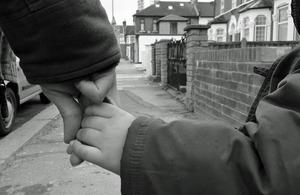Parental Child Abduction is a worldwide problem
New figures reveal that the number of parental child abduction cases dealt with by the Foreign Office has risen by 88% in under a decade.

In the last year alone the Foreign Office’s Child Abduction Section fielded an average of four calls per day to its specialist advice line, more than half of which were new cases .
A worldwide problem
Parental child abduction – where a parent takes a child without the permission of those with parental responsibility – is now a worldwide issue. In 2003/04 we worked on cases in 51 countries; now cases relate to 84 different countries, showing just how widespread the problem has become.
We also fear that these statistics are just the tip of the iceberg; many cases go unreported as parents seek custody of their children through foreign courts.
Raising awareness
Public understanding of parental child abduction is alarmingly low.
The research we commissioned shows that half the UK population believes the government can intervene to order the return of a child to the UK if he or she has been abducted by a parent.
The reality is that whilst help is available, parental child abduction cases can take years to resolve. This has significant impact on those concerned and there is the strong possibility that the child may never be returned.
It is also much harder to return a child from a country that has not signed the 1980 Hague Convention, an international agreement between certain countries which aims to ensure the return of a child who has been abducted by a parent.
Legal and financial reality
Despite parental child abduction being against the law, a quarter (24%) of people do not think, or are unaware, that it’s a crime for a parent to take their child overseas without the consent of others with parental responsibility.
When asked which parent they thought was more likely to abduct a child, three quarters (74%) of people thought it was fathers. Yet according to statistics from the Reunite International Child Abduction Centre, 70% of the charity’s cases concern mothers taking the child.
As well as this emotional distress, both parents may often face severe financial difficulties as they fight for custody of their child through foreign courts. The statistics show that people tend to underestimate just how much getting a child back costs, including legal fees overseas and in the UK which may continue to mount up even after the child is returned to this country.
There also seems to be a lack of awareness about who pays the costs of resolving a parental child abduction case involving a non-Hague country. Sixty-two per cent either didn’t know or responded with the wrong answer, and only 38% answered correctly by saying it was the parents who would pay, not the UK Government.
The expert view
Daisy Organ, head of the Foreign Offfice Child Abduction Section said:
“The increase in parental child abduction cases is a major cause for concern, particularly in the lead up to the school holidays; we know that before or during school holidays is one of the most common times for a child to be abducted. We hope that this campaign will help inform and educate the UK public and encourage parents thinking of abducting their child to think twice before they cause significant distress to themselves and their family. “
Alison Shalaby, Chief Executive of Reunite, said:
“It is important to remember that parental child abduction is not faith or country specific. 71% of the UK public thought that parents most commonly abduct their children to the Middle East, India and Pakistan but it can happen to anyone, from any background. Countries where children are abducted to can range from Australia, to France, to Thailand.
“We have seen a 20% increase in calls made to our helpline in the first half of 2012 compared to 2011 and a 67% increase in the number of children who have been abducted by a parent to a non-Hague country between 2001 and 2011.
“This issue is not going away and with a 47% increase in the number of child abduction cases Reunite has worked on between 2001 and 2011, we are urging parents to think twice before they abduct their child or seek help if they think their child is at risk.”
Contact information
If you are concerned, or if your child has been abducted, you can call FCO Consular Assistance on 0207 008 1500 or visit our child abduction information, or Reunite on 0116 2556 234.
Travel safely this Christmas
Download our Plan. Pack. Explore. app for iPad and iPhone and Android devices
Further information
Child Abduction: Case Studies
- Nicky Hewitt, 34 born in Melbourne, grew up in Surrey
- Steve Grant, 54, from Portsmouth
- Alexander Khan,37, from South Coast
Check our travel advice for your destination
Follow Foreign Office travel advice on twitter @fcotravel